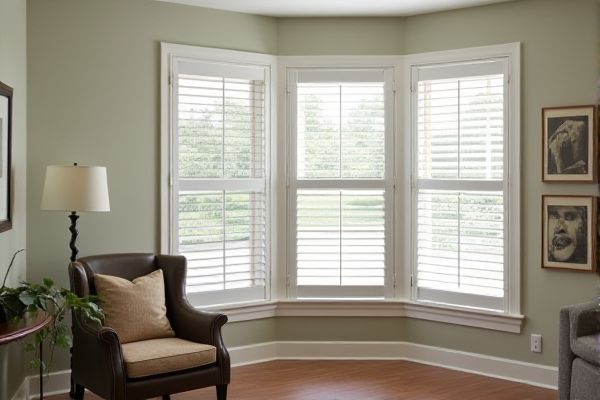
Inside mount blinds fit snugly within the window frame, offering a clean and streamlined appearance that highlights your window's architecture while saving space. Outside mount blinds cover the window entirely and can make windows appear larger, providing better light control and privacy; explore the advantages and considerations of each option in the rest of the article to find the best fit for your space.
Table of Comparison
| Feature | Inside Mount Blinds | Outside Mount Blinds |
|---|---|---|
| Installation Location | Mounted inside the window frame | Mounted outside the window frame |
| Space Usage | Utilizes window recess space | Saves window recess space |
| Light Control | Precise fit reduces light gaps | Can block more light by covering frame |
| Measurement Accuracy | Requires exact window measurements | Allows for less precise measurements |
| Visual Effect | Clean, streamlined look | Creates a framed, bold statement |
| Window Condition | Best for deep, squared window frames | Ideal for shallow or uneven frames |
| Cost | Generally less material used, can be cheaper | May require more material, slightly higher cost |
Understanding Inside Mount Blinds
Inside mount blinds fit snugly within the window frame, offering a clean and streamlined appearance that highlights architectural details without protruding beyond the window. Precise measurements of the window's depth, width, and height are essential to ensure proper installation and smooth operation within the frame. These blinds maximize natural light control and privacy while maintaining a minimalist aesthetic ideal for modern interiors.
Overview of Outside Mount Blinds
Outside mount blinds are installed on the wall or molding outside the window frame, offering greater flexibility in size and style, and can make your window appear larger by covering more area. These blinds are ideal for windows with shallow frames or obstructions that prevent inside mounting, providing enhanced light control and privacy. Choosing outside mount blinds allows you to hide unattractive window trim or damage while adding a decorative element to your room.
Key Differences Between Inside and Outside Mounts
Inside mount blinds fit within the window frame, providing a sleek, tailored look that maintains the architectural detail of the window. Outside mount blinds attach to the wall or molding outside the window frame, offering greater flexibility in coverage and the ability to make windows appear larger. The choice depends on factors such as window depth, light control preferences, and aesthetic goals.
Aesthetic Appeal: Sleek vs. Bold Looks
Inside mount blinds offer a sleek, minimalist aesthetic by fitting snugly within the window frame, creating a clean and streamlined appearance that enhances modern interiors. Outside mount blinds provide a bold, dramatic look by covering the entire window and surrounding wall area, making them ideal for adding visual impact and masking imperfections. Your choice between the two depends on whether you prefer subtle elegance or a strong design statement in your space.
Space and Window Compatibility Considerations
Inside mount blinds require precise window frame measurements and are ideal for windows with sufficient depth, preserving the window trim for a clean, streamlined appearance. Outside mount blinds offer greater versatility for shallow window frames or irregular shapes, expanding coverage beyond the window frame to block more light and enhance privacy. Space constraints and the architectural design of the window dictate the choice between inside and outside mount blinds for optimal fit and functionality.
Installation Requirements and Ease
Inside mount blinds require precise measurements and a sufficient window depth to fit snugly within the window frame, ensuring a clean and streamlined look. Outside mount blinds offer more flexibility, as they install on the wall or molding around the window, accommodating shallow window frames or irregular shapes without depth constraints. Your choice affects installation complexity; inside mounts demand careful fitting, while outside mounts generally allow easier, more forgiving installation.
Light Control and Privacy Comparison
Inside mount blinds offer precise light control by fitting snugly within the window frame, allowing minimal light leakage and enhanced privacy through a seamless seal. Outside mount blinds cover a larger area beyond the frame, reducing light gaps and providing superior privacy by blocking sightlines from multiple angles. The choice affects how effectively natural light is managed and how securely privacy is maintained in residential or commercial spaces.
Measuring Windows for Each Mount Type
Measuring windows accurately is essential for inside mount blinds to ensure a snug fit within the window frame, requiring precise width, height, and depth measurements of the recess. For outside mount blinds, you should measure the full width and height of the desired coverage area, extending beyond the window frame to block light effectively and maintain privacy. Your measurements must accommodate any molding or trim to guarantee proper installation and optimal functionality for each mounting style.
Pros and Cons: Inside Mount Blinds
Inside mount blinds offer a sleek, custom-fit appearance by fitting within the window frame, maximizing space and preserving trim visibility. They provide precise light control and a clean, streamlined look but may be limited by window depth and require accurate measurements for proper installation. These blinds can be more challenging to clean due to their recessed position and may allow light gaps around the edges if the frame is uneven.
Pros and Cons: Outside Mount Blinds
Outside mount blinds offer advantages such as providing complete window coverage and the ability to accommodate window casings that are too shallow for inside mounts. They can make windows appear larger and allow for easier access to window trim and handles. However, outside mount blinds may require more precise measurements to avoid gaps and can sometimes obstruct surrounding wall space or architectural features.
 homyna.com
homyna.com